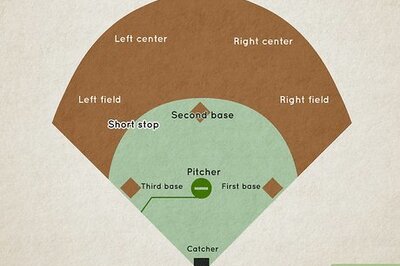
views
Forty years ago I landed at Frankfurt International Airport. I was West Germany’s newest immigrant, though I didn’t know it yet. I thought I was just passing through, on my way from one side of the globe to the other. But I was here to stay.
I came from India and was, I thought, headed for Guyana, in South America. My purse was almost empty—I had a few crumpled rupees but not a single Deutsch Mark. I wore a simple cotton two-piece suit—long skirt and blouse, made on the cheap by an Indian street-side tailor—and flip-flops on my feet. The weather was too cold for flip-flops; but all that was about to change.
I was met at the airport by a young man who whisked me into the city in a blue Opel Commodore. "This is your car," he said. He was a fast driver and we were home in no time, home being a studio in Frankfurt Ginnheim. He didn't even have a bed, but slept on a pull-out couch. He said I could stay as long as I wanted. That was in April. We married on August 4th.
It was the beginning of an odyssey that was to turn inside out; old habits had to die, old ways of thinking refurbished, new ideas and ways of living tried out, adapted, adopted. It was the beginning of a love-hate affair with a country that couldn’t be more different than the one I had come from.
Immigration is not easy. It’s not just a matter of crossing a border, unpacking your suitcase, and settling in. I came from a culture that, you could say, was the diametrical opposite to Germany’s, via a third country, India. Adapting to India’s lifestyle had been relatively easy. I came from a culture of casualness—an easy-going Caribbean insouciance that translated well into India’s the take-each-day-as-it-comes attitude to life. I lived in the present: imprecisely, spontaneously, some would say, heedlessly. I was reckless by nature, plunging into situations and events without careful planning. That worked well in India. Not so much in West Germany.
When cultures clash, it’s the majority culture that wins. That must win. It is incumbent for a new migrant to adapt and adopt, not the other way around. And so, this being the new situation in my life, I plunged wholeheartedly into the task of Germanisation, with sounds like something rather unsavoury, but isn’t.
Adapting to another culture, done with the good intention to become a part of the new society, is a good thing. It means dropping some old habits, yes. It means letting go of some deeply ingrained ways of thinking, ways of being, ways of living, yes. It does not mean a loss of identity, as I have heard some people complaining.
It means the taking on of a new identity, a blend of what one brings from the past into what one is becoming in the present. It means expanding one’s inner borders, one’s inner boundaries. In the end it can mean becoming a better person.
In my case, it meant becoming a more efficient person, and that, in the end, means more, not less, freedom. Germany brought order into my rather chaotic lifestyle. Order means, for instance, finding things more quickly. It means less time wasted by procrastination. It means balance. It means merging the over-relaxed go-with-the-flow drifting into more precise channels; it means less time wasted. It means a better life. And it works both ways. Germans, too, have changed, but in the other direction.
The cliché attached to Germans is this: that they are a dour, crotchety folk, rigid, meticulous, precise, and just a little anal in their cleanliness and expectation of perfection. That might have been true forty years ago, when I first arrived; I remember well my first real immersion in German everyday life.
Coming from India, quite a revelation. I would look around at the people in the tram on my way to German classes: all these tight-lipped people grey-in-grey, so grim and grumpy, on their way to work or wherever. Nobody looked at anybody else, nobody smiled at anybody else. No interaction at all. By contrast, India, where the women wear brightly colored saris and flowers in their hair and look around and catch your eyes and smile at you and even if they don't speak a word of English try to find out everything about you, using hands and gestures and make you feel like the most interesting person on earth. West Germany was a cold, alien place.
Not any more. Forty years on, and it has changed almost beyond recognition. The reason is this: crossing borders. Germans travel. They can be found in every corner of the earth, mixing, learning, absorbing.
A relaxing of the stiffness, a welcoming of the “other”, is the welcome result, as we have seen so clearly in recent months with the reception of refugees.
As Germany opens its arms to these new people from an alien culture, we can only hope and pray that the newcomers too understand the rules of border-crossings: that they adapt, try to fit in, drop the old attitudes that don’t work here. They too will change Germany forever. There is no going back.




















Comments
0 comment